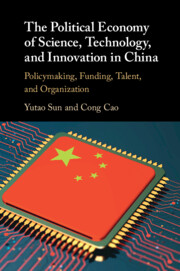 The Political Economy of Science, Technology, and Innovation in China
The Political Economy of Science, Technology, and Innovation in China Mission-Oriented Mega–Research-and-Development Programs
Published online by Cambridge University Press: 07 August 2023
The sixth chapter extends theoretical and empirical interests in understanding the role of the Chinese government through its organization of mission-oriented mega-R&D programs (MMRDs). In particular, this chapter proposes a theoretical framework with a particular focus on such programs’ three contextual characteristics – technical goal of the mission, dominant actor, and end-user. We then apply the framework to ten cases across different historical periods and sectors in different countries to test its validity. The finding suggests that exploitative R&D with a clear and singular technical goal whose performer and end-user are public actors entails government to adopt MMRDs, while in doing so the government also should take into consideration such factors as economic efficiency, national security, and public interests. In the case of China, the state-led innovation model favors to concentrate resources on initiating MMRDs.
To save this book to your Kindle, first ensure no-reply@cambridge.org is added to your Approved Personal Document E-mail List under your Personal Document Settings on the Manage Your Content and Devices page of your Amazon account. Then enter the ‘name’ part of your Kindle email address below. Find out more about saving to your Kindle.
Note you can select to save to either the @free.kindle.com or @kindle.com variations. ‘@free.kindle.com’ emails are free but can only be saved to your device when it is connected to wi-fi. ‘@kindle.com’ emails can be delivered even when you are not connected to wi-fi, but note that service fees apply.
Find out more about the Kindle Personal Document Service.
To save content items to your account, please confirm that you agree to abide by our usage policies. If this is the first time you use this feature, you will be asked to authorise Cambridge Core to connect with your account. Find out more about saving content to Dropbox.
To save content items to your account, please confirm that you agree to abide by our usage policies. If this is the first time you use this feature, you will be asked to authorise Cambridge Core to connect with your account. Find out more about saving content to Google Drive.